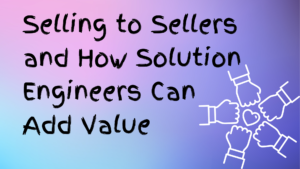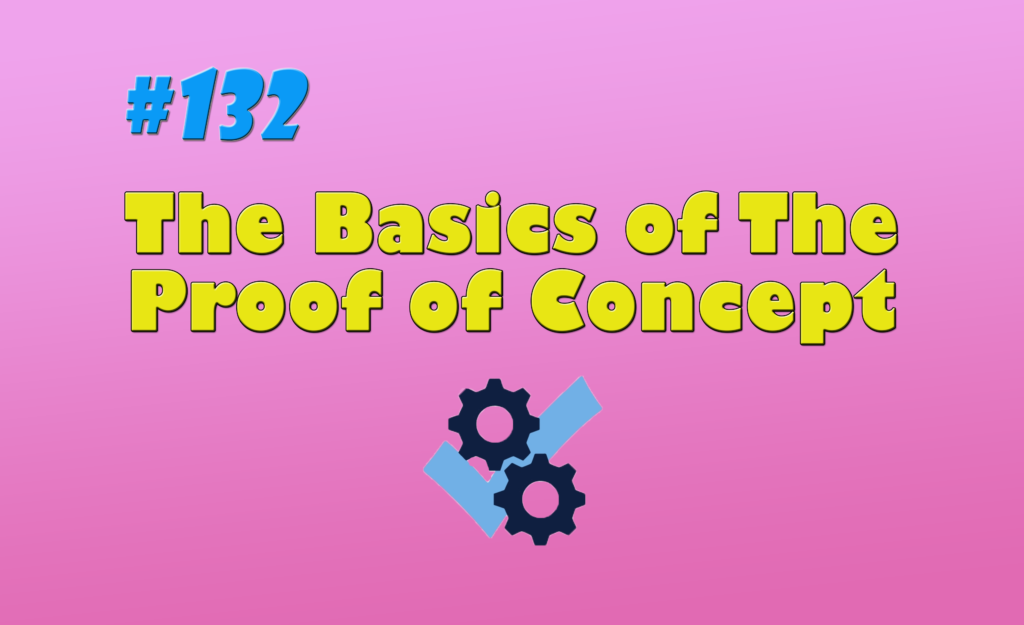
If you’re a Sales Engineer, you’ve probably done your fair share of proof of concepts (PoC) throughout your career. Sometimes a customer requests them, but more often than you’d like to admit, you probably offered them to your customers because you wanted to show how your product meets whatever their need. But is the PoC really that necessary to “close the deal”? Or is there a better way to go around it and still be able to show the value of our solution to your customers’ problems without wasting the time and resources of everybody in the room?
Fortunately, we have someone on the podcast today enlightening us on this tricky activity. Tony Matos leads the sales engineering team at CITRIX, Canada, and is the author of the book, The Essential Guide to Navigate your Proof of Concept. He shares with us his mistakes as an SE early on in his career, how he moved up the ranks and became a presales leader, and how he thinks all SEs should navigate the PoC.
P.S. If you work with someone who, in the middle of the call with a customer, says something like, “Oh, let’s give you some licenses to try it out”, share this podcast episode with them. They’ll need it.
Key Takeaways:
Tune in to our conversation and learn:
- His beginnings as a Sales Engineer and how he moved up the ranks as a SE leader
- The similarities and nuances of sales engineering teams across industries and companies
- What makes a sales engineering team more engaged in their work
- Why he thinks SE can be more involved other than technical skills and expertise
- Aspects of the PoC that most SE take for granted
- What a proof of concept really is about and when is it appropriate to do
- What motivated him to write The Essential Guide to Navigate your Proof of Concept
- What you should really be doing before agreeing to do a PoC
- Why what is done before and after the PoC is equally important than the PoC itself
- Can we bypass a PoC even when a customer requests it or is there a specific situation where it’s appropriate?
Quotes:
17:16 “We need to write more materials for the sales Engineering profession… There isn’t enough quantity out there in terms of materials and training for our profession.”
42:35 “A proof of concept is always about illustrating the possibility of something, Now in a PoC, it might be a very specific thing or process or workflow or integration they wanna see, and that’s all fine, but it has to be a list of 3 things, not a list of 30 things. So, it should be very much about illustration and not implementation.”
58:55“I think showing curiosity especially to a customer shows a level of respect that you care about things other than just the technology thing that you’re gonna solve.”
Not So Fire Round
- What do you love about sales engineering or presales leadership?
I just love the fact that we have to know a solution really well. I think there’s a lot of satisfaction with investing yourself with great organizations to know a solution really well. i get a great sense of satisfaction for people being able to call me up and have a sense of confidence and bringing me in as part of a thing that needs to be solved.
Sales engineering is just a great profession because it requires so many disciplines to come into play, and it really requires you to keep improving yourself and learning so that sort of fires me up.
- What would you change about Sales engineering leadership?
We need to put a little bit more focus on the sales side of sales engineering.
We should know the sales strategy really well with our sales rep.
- What are some other books, tools or resources you would recommend for sales engineers and salespeople?
Mastering Technical Sales: The Sales Engineer’s Handbook 3rd Edition by John Care
Great Demo!: How To Create And Execute Stunning Software Demonstrations by Peter Cohan
Developing the Leader Within You 2.0
- What separates great sales engineers and salespeople from the not so great or ordinary ones?
Curiosity and collaboration.
Being curious about things internally, but also what’s more important, is being curious with the customers.
Doing everything you can to be collaborative and seeking to understand people are great skills to have because it opens up possibilities of things you never considered
Connect with Tony on Linkedin:
Get access to the book on Amazon:
Check out his POC Essentials website for more resources on sales engineering and proof of concepts: https://pocessentials.com/
If you enjoyed this podcast, please support the show by dropping a review or rating on iTunes. https://podcasts.apple.com/us/podcast/we-sales-engineers-resource-for-sales-engineers-by/id1378292171
And if you’ve been affected by COVID as an SE, please check out our Leave No SE Behind initiative so that we can help you. https://wethesalesengineers.com/no-se-left-behind-initiative/




This Post Has One Comment
Pingback: 4/1/1 PoC =/= "Perfected on Creation" | We The Sales Engineers